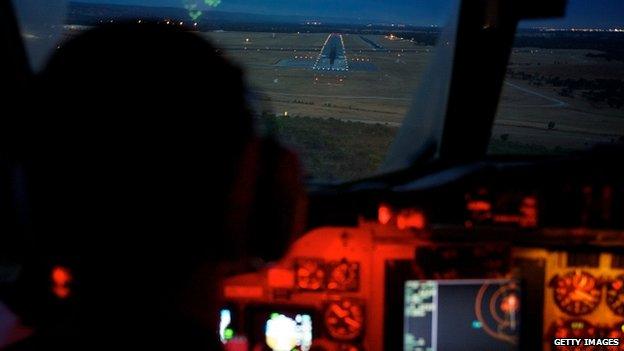Flight MH370 'crashed in south Indian Ocean' - Malaysia PM
- Published
Najib Razak: "It is with deep sadness and regret, that according to this new data, flight MH370 ended in the southern Indian Ocean."
Malaysia's prime minister has announced that missing flight MH370 crashed in the southern Indian Ocean.
Najib Razak said this was the conclusion of fresh analysis of satellite data tracking the flight.
Malaysia Airlines had told the families of the 239 people on board, he said.
The BBC has seen a text message sent to families by the airline saying it had to be assumed "beyond reasonable doubt" that the plane was lost and there were no survivors.
There were 227 passengers on flight MH370, many of them Chinese.
Relatives of those on board who watched the announcement at a Beijing hotel wept with grief, and some were taken away on stretchers by medical teams.

Passengers' relatives in China took in the news with a mixture of deep anguish and some anger
China has demanded that the Malaysian authorities make available the evidence on which they based their announcement about the jet's fate.
And some relatives of Chinese passengers expressed scepticism about their conclusion, as the plane has not been found yet.
Flight MH370 disappeared after taking off on 8 March from Kuala Lumpur.
A big international search operation has been taking place in the southern Indian Ocean, along the southern arc or corridor of the plane's possible route, more than 1,500 miles (2,500km) off the south-west coast of Australia.
However, the search had to be suspended on Tuesday due to bad weather, the Australian Maritime Safety Authority (Amsa) said, external.
In the past day, both Australian and Chinese air force crews have reported spotting debris.
The unidentified objects have been seen in separate parts of the vast search area, in some of the world's most treacherous and remote waters.
Heartbreaking
The announcement by Prime Minister Najib Razak came at a late-night news conference in Kuala Lumpur.
It was based on new analysis by British satellite firm Inmarsat, which provided satellite data, and the UK's Air Accidents Investigation Branch (AAIB).
The firms "have concluded that MH370 flew along the southern corridor, and that its last position was in the middle of the Indian Ocean, west of Perth," Mr Najib said.
"This is a remote location, far from any possible landing sites. It is therefore with deep sadness and regret that I must inform you that, according to this new data, flight MH370 ended in the southern Indian Ocean."
Mr Najib appealed to the media to respect the privacy of the families of the passengers and crew, saying the wait for information had been heartbreaking and this latest news harder still.
Footage from an Royal Australian Air Force P-3 Orion aircraft shows a smoke marker where an object was spotted
Malaysia Airlines later said it informed the majority of the families in advance of the prime minister's statement in person and by telephone, and that text messages "were used only as an additional means of communicating with the families".
The text messages read: "Malaysia Airlines deeply regrets that we have to assume beyond any reasonable doubt that MH370 has been lost and that none of those on board survived... we must now accept all evidence suggests the plane went down in the Southern Indian Ocean."
Selamat Omar, the father of a 29-year-old aviation engineer who was on the flight, said some family members of other passengers broke down in tears at the news.
"We accept the news of the tragedy. It is fate," Selamat told the Associated Press in Kuala Lumpur.
Fresh analysis methods
Inmarsat had already revealed that it did indeed receive signals - automated "pings" - from the plane over its satellite network after the aircraft ceased radio and radar contact.
Sources told the BBC that flight MH370 continued to ping for at least five hours after the aircraft left Malaysian airspace - which indicated the plane was intact and powered.
And initial analysis showed the location of the final "ping" was probably along one of two vast arcs running north and south.

Monday was the fifth day of operations to search remote areas of the southern Indian Ocean
On Monday, the Malaysian prime minister said Inmarsat had been able to shed further light on the plane's flight path by performing further calculations on the MH370 data "using a type of analysis never before used in an investigation of this sort".
According to Inmarsat, this involved a totally new way of modelling, which was why it took time.
The company told the BBC the new calculation involved crunching far more data and that engineers spent all weekend looking back at previous Malaysia Airlines Boeing 777 flights.
They compared the satellite data from those flights with flight MH370 and were able to work out that it went south.
As far as the engineers could tell, the plane was flying at a cruising height above 30,000ft, but its final position could not be pinpointed more clearly, says BBC transport correspondent Richard Westcott.
Inmarsat gave the AAIB the new data on Sunday, it said, which had to be checked before it could be made public.
